Conversation with Randall Runk: Fixing Information Distortion with AI to Increase Sales
Jul 24, 2020
As part of our ongoing interview series with industry experts, we recently had the opportunity to speak with Randall Runk, a highly experienced Strategy, Sales, and Operations executive. Randy was formerly a Senior Strategy Advisory at professional services giant Deloitte as well as a former Executive VP of WW Field Operations at cloud services and data management company NetApp. Randy also recently joined the Aviso Advisory Board. While speaking with Randall, we were curious to learn from his tremendous experience working at the forefront of various inflection points in the tech industry. Below, you’ll find various video snippets and their transcriptions of our conversation with Mr. Runk.
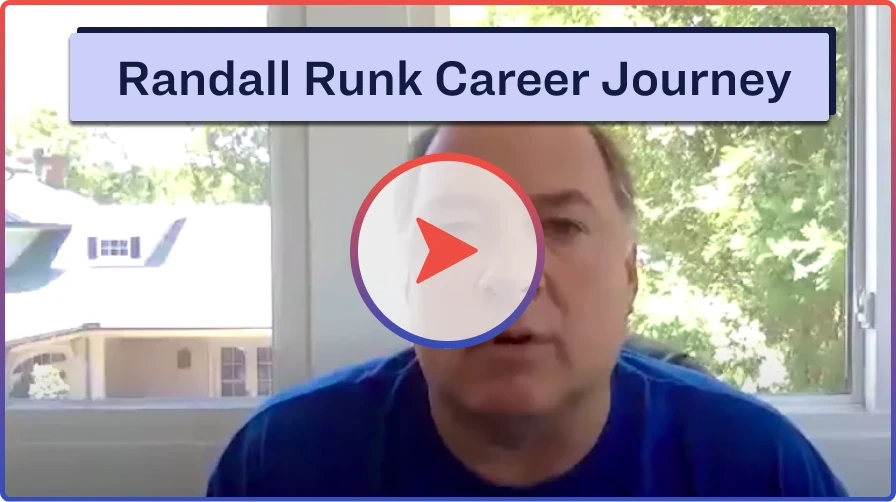
Aviso: Can you give us an overview of your career journey? Randall: As you know, I started out at Pricewaterhouse. I was in the technology organization within Pricewaterhouse in a consulting group. During my career there, I pretty much specialized in large scale ERP implementation types of projects. If any of you remember the days of McCormack & Dodge in MSA software, I actually began my career helping companies drive value out of those particular solutions. Ultimately, that morphed into the firm’s SAP and their Oracle practices. I ran the Oracle practice for PwC in the Americas. That’s kind of what I found to be really interesting -- working with large multinational companies in addressing their technology frameworks to support the business and to really gain a lot of insight into some of the issues that companies have in terms of embracing technology. Also thinking that when they implemented technology, it was gonna solve all their problems. In most cases, it never solved all the problems and it probably was only a very small fraction of the problems. It was not the technology necessarily, it was really the processes that were enabled by technology, the data that was enabled by technology. Then the human element, the type of talent that you had in your company and how they exercised the use of the technology. It was an interesting time of my career to see that and I think it framed my thinking in terms of even today how you use technology and where you apply it. How you provide care to whatever solutions you’ve implemented. That’s what my success as I transitioned out of consulting into running large scale sales organizations. It really created kind of the launch pad for me in terms of how I saw the elements of what my responsibilities as a sales leader were in how to address and transform these sales organizations to get a better result than they were getting before I was brought in to help do that transformation. When I left PwC and went to Oracle, the reason I was brought in was to provide a different type of selling motion into Fortune 500, Fortune 300 types of companies. And to get into more of a consulted type of sales motion as opposed to a feature-function sales motion which Oracle was historically been well known for being able to sell functions and features but pretty light on how they translated that into business value and how that may have impact on a company’s bottom line in terms of using the technology. There was a lot of selling of software based on the fact that it was cool and not necessarily on what drove the bottom line and what would really engage a CFO in a conversation around why it was important to make that kind of a huge investment. If you remember those ERP implementations, those were huge, huge projects. I had one that was a $100 million cost to the company that engaged us. They weren’t trivial and the companies were kind of betting their company on that software transformation and so it became really a key ingredient to be able to use a north star of business value and business outcome versus “Hey, I just got this software in and it works,” which is what had been done in the past. So anyway, the Oracle experience was really good. That led to me being recruited into HP by Mark Hurd. I ran the US sales organization for HP. Basically had everything in their portfolio with the exception of PCs and printers. Iid that for several years. When we acquired EDS, I was asked to go down there and be one of the four executives from HP to help bring EDS into the fold. I ran worldwide sales for that EDS organization and then subsequently, I spent a couple of years at Infor and then a year at NetApp. In all those roles it was basically running a multinational large-scale sales organization to sell software for and/or hardware.
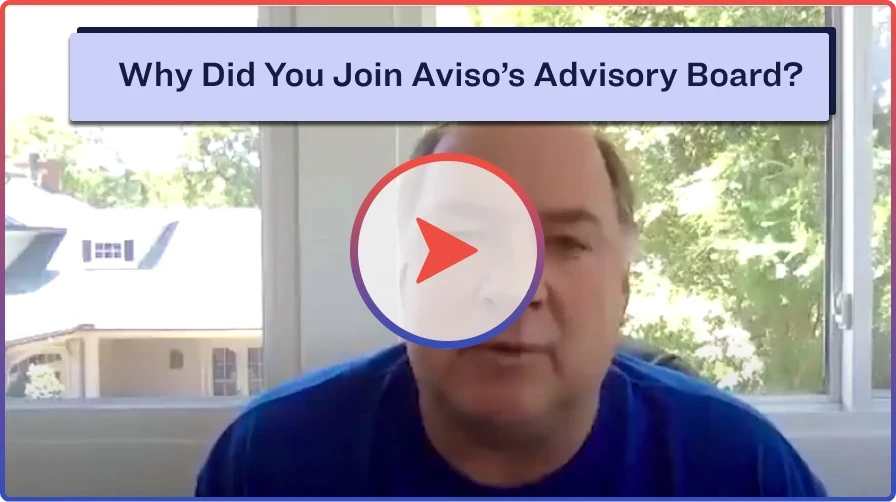
Aviso: Why did you join Aviso’s advisory board? Randall: Number one, I have an incredible amount of respect for Trevor. Trevor worked for me at Oracle. He was one of the all-stars of the sales team at Oracle so I’ve always worked closely with him. I consider him a good friend in addition to my colleague. When I saw that he had joined Aviso as the CEO, I actually reached out and congratulated him. I thought it was a great move for him. He said, “Well, did you ever think about serving on a board?” And I said, “Well, interesting enough that’s really where I’m focused right now; it’s to join a few boards. This could be an ideal thing for me to connect with you over and if you want me, I’d be more than delighted to join as an Advisory Board member.” So number one was Trevor and number two is that the artificial intelligence component of the Aviso solution is cutting edge. Sales leaders and sales executives are looking at different solutions that offer better predictability in the whole selling motion. There’s been a digital transformation in sales. Lots of technology thrown at the typical problems that sales executives have; territory management, opportunity management, contract management, all those types of things. Each one of those solutions, and there’s a myriad of them, all create data. The data becomes very difficult to get insight from regarding the implications from different sources and how that all comes together to help you create actionable plans that actually allow you to close deals. I see Aviso as the great solution to actually tackle the problem of information distortion that’s created by all those sources of data. How do you bring that together and provide insight to sales leaders and sales reps on how best to prosecute their deals in the most efficient and with the most efficacy that they can to basically provide more velocity from a deal from the beginning to the close? How do you get those things done quickly and how to get them done in a predictable manner. So that’s why I was pretty jazzed about when Trevor asked me if I’d like to join the board. I said, “Count me in. I think this is a fabulous solution and I wanna be part of it.”
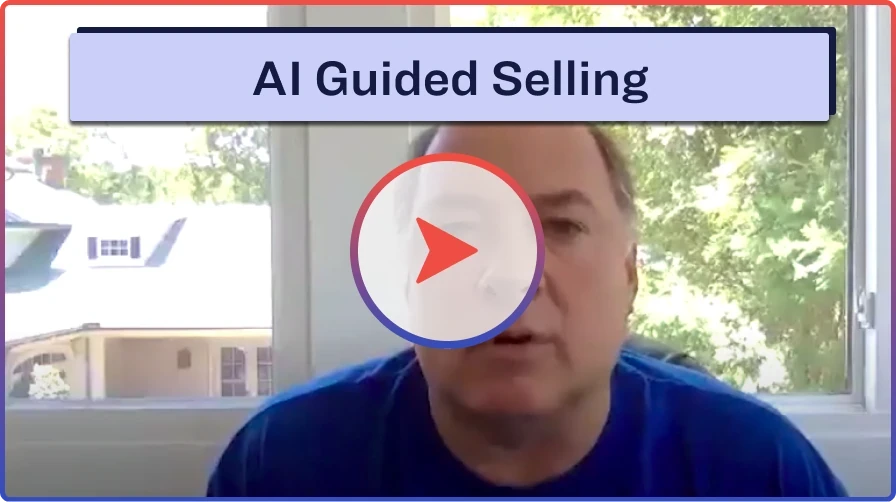
Aviso: How does AI give guidance to help teams close more deals? Randall: There are sales reps that are excellent and they have very good insight into their customers. They have good instincts for pressing a button to go after something and to take action or whatever. But, they’re probably less than 10% of the whole sales force. Then you have another large swath of sales reps, I’d say 80% of the sales reps. With them, they kinda get it and they kinda don’t get it. They’re always a day late and a dollar short in many cases on what should’ve been executed last week versus this week. Then you have another subset of 10% that just really doesn’t matter what you do with them, they’re not gonna be able to step up to what you wanna do. Where Aviso fits into this is its ability to capture emails, to capture phone calls, to capture relevant metadata and detailed data around all the various interactions with a customer and also around the deal. To be able to put that in a form that provides alerts. It’s time to call on this client. You have an email that you were gonna meet with them on such and such a date. In many cases reps will get lost in a deal because they have another big deal that came in. They ignore everything else that’s going on and they go after the big deal because they wanna get a close for the quarter. But they end up not meeting their quota. The Aviso solution helps to keep that information front and center and helps the overall sales organization, the executives, product management, etc. to orchestrate a better interchange with that customer around a selling opportunity. That’s the real kind of the holy grail of selling is to have the knowledge so you know when to execute and when to pull the trigger on certain types of things that you’re trying to do with the customer. It’s lassoing all that data and then converting it into actionable steps that the reps can use that to help them perform better. Their sales managers can use it to help know where to focus their time across the 7 to 10 reps that they might have under their organization. That’s where the value comes from Aviso.
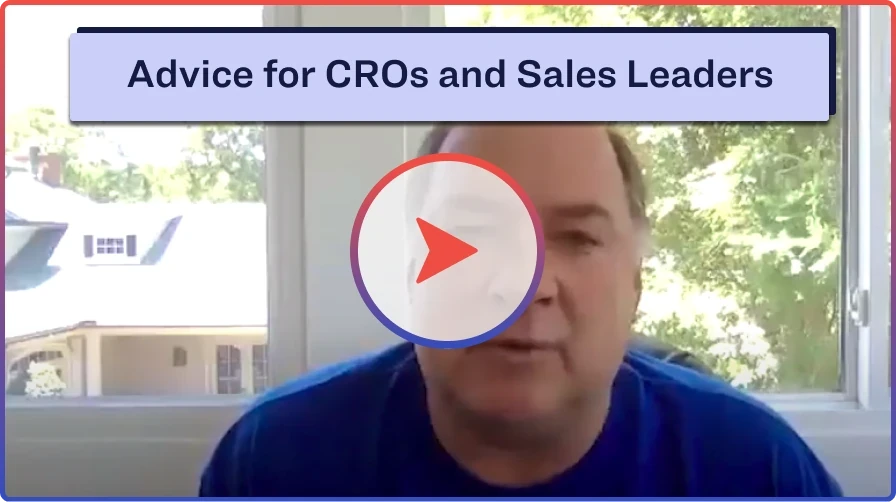
Aviso: What’s your advice for sales leaders and CROs on how they can manage culture friction while teams are WFH? Randall: Communication. Sales leaders have to get up and get out virtually with town halls. They have to take the time. I used to do all these town halls. Actually, I did them physically. Every time I did them, I would go, “Is this meaningful to the audience? Does it make sense?” Every time that I ask that question in small groups, people go, “We’d love to have executives speak out and continue to keep us up to date with where the company is headed.” It looks like there’s more transparency. You’ve removed fear from people. Sales people are always constantly in fear that they’re going to get fired because they are not making their quota or they didn’t hit the quota at the right time of the year and that kind of stuff. When you can give the organization a sense of comfort, then that organization will perform at a higher level. What I would recommend to a sales leader is to over communicate. If you think that you’re communicating more than you need to, you’re probably wrong. You could be communicating every day to different organizations and different audiences to keep people informed because informed employees they will really then focus on what their job is and get it done rather than spending half the day on the phone calling people. Did you hear this? Is this true? I think that executives have to step up to that and I think it’s all executives. It’s the CEO, it’s the CFO; the whole executive team has to be much more front and center in times like we have today.
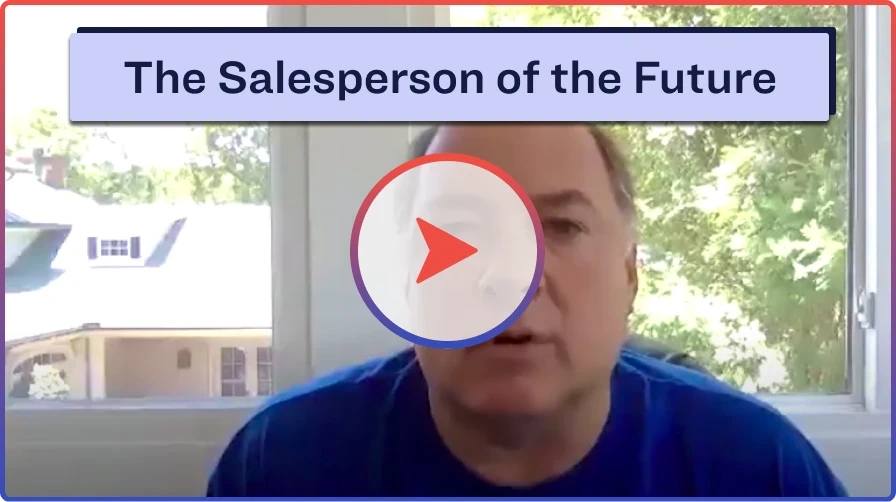
Aviso: How do you see the function of the Salesperson evolve in the 2020s in regards to AI? Randall: Will sales reps be replaced by artificial intelligence in the selling process? I don’t think that ultimately there will just be a webstore and people will just buy off a store and we don’t need sales reps anymore, particularly in enterprise selling. You can do it with high-volume products but I don’t think you can do it with value products and services. When you’re a buyer, if you’re a CIO or an executive and you’re buying a tool for $10,000 you’ll probably buy it off a webstore. But if you’re gonna spend on something that’s gonna take millions of dollars of investment to operationalize and ultimately drive transformation to your company, you’re gonna want to have a conversation about it. You’re gonna want a series of presentations, justifications, analyses that support that if you do X, you’re gonna get Y and the confidence level that you’re gonna get Y is 95%. You’re gonna want to have that conversation with somebody across the table. The sales force will need to become more conversant in the value drivers of the companies that they’re calling upon. I’ve been a big advocate of industry selling. Meaning that if you’re gonna sell to a bank you better have a good understanding of how banks make money, what their business models are, and you can speak in the language of that industry and connect with that executive who’s gonna spend multi-million dollars on something. That you need to be able to talk that language. It’s going to even get more intense. You don’t only have to know the industry; you have to know the company because you have to know their culture. You need to know what their talent pools are like. The more sophisticated the rep, the more sophisticated dialogue and discussion that a rep can have is going to demand so that they become smarter about who their end customer is. If you go down that path, the days of a rep covering 20 accounts or 100 accounts are over. There’s just no way you’re going to be able to have any relevance to an end customer, if you just are tryna talk to 20 different customers across the globe or across whatever your territory is. If you take that line of thinking around knowing more about that company, all the data that gets created in that type of a sales motion, and again I think the AI components of Aviso hit that squarely in terms of how to get that data into a usable format.







